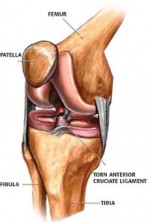A ‘SMART’ choice for athletes

Women are between 200 and 800 percent more likely to get anterior cruciate ligament injuries in their knees. The disproportionate amount of female athletes who get ACL injuries has spurred the USF Orthopedics and Sports Medicine department to take action.
The Sports Medicine and Athletic Related Trauma Institute (SMART) has implemented the “Prevent Injury, Enhance Performance” (PEP) program at high schools in Hillsborough county to stave off the damaging injury.
ACL injuries cause pain, swelling and often require costly corrective surgery, according to the National Institutes of Health. The injuries can also result in arthritis and instability of the knee joint. Research suggests that females are at greater risks of tearing their ACL, which connects the shinbone to the thighbone.
SMART’s PEP program works as a warm-up routine that aids in the prevention of ACL injuries in female athletes.
SMART is sending certified athletic trainers to high schools to guide the 15 minute PEP regimen. There, female athletes perform warm-up exercises two to three times a week to strengthen and stretch the muscles around their knees while also teaching them different landing techniques to avoid tears in the ACL.
“These landing techniques should become second nature to the athletes,” said Barbara Morris, assistant director of SMART.
Female athletes are two to eight times more likely to tear an ACL than their male counterparts, Morris said.
“It’s a lot more cost-effective to prevent the injury from happening than to have someone have to go through surgery and six to eight months of rehab,” Morris said.
The athletic trainer for Freedom High School, Michelle McCoy, said the PEP program involves actions such as sliding back and forth between cones, jogging, lunging and jumping to work on agility.
“The PEP program is designed to encourage proper landing technique as well as build strength,” she said. “It helps benefit them because it serves as their warm-up and they are able to jump right into their practices.”
Dr. Robert Pedowitz, chair of Orthopaedic Sports Medicine at USF, said ACL injuries are very common in sports such as basketball, soccer or football where athletes tend to step and change directions frequently.
When athletes tear an ACL, they usually hear a popping sound and then the knee begins to swell. Corrective surgery can range from $25,000 to $40,000.
The NCAA has collected statistics comparing the number of hours that both male and female athletes participated in sports and the injury rates experienced within those same hours. Results showed that females were four to 10 times more likely to have a torn ACL per hour, Pedowitz said.
Some researchers suggest that hormonal properties might affect ACL vulnerability of females, while others believe wider pelvises may be causes. The reasons for these disparities are numerous yet none are completely conclusive.
“There are obvious differences between men and women, such as more estrogen or differences in build,” she said. “But, all of the research has turned out to be neutral and nobody has proven that any of those are the reasons why.”
Pedowitz believes a major cause of the disparities between the number of male and female ACL injuries could be related to the differences in the way males and females learn to play sports at young ages and the way women jump and land while playing.
Programs like PEP will be beneficial in preventing injuries early on by teaching females correct landing postures and habits that will protect their ACLs during sporting activities.
“It’s a very low-risk program to do and it’s very inexpensive to do,” Pedowitz said. “We know that one of the most important injuries that happen in sports is an ACL tear, therefore our objective is to do whatever we can to decrease that risk.”
Pedowitz said that the development of the PEP program at USF is likely and currently under discussion within the athletic department.






